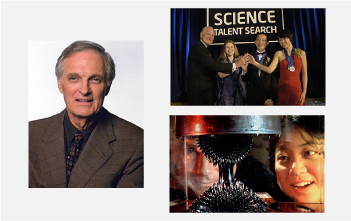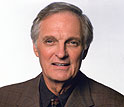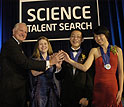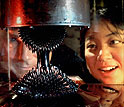News Release 06-074
National Science Board Announces 2006 Public Service Awards
Actor Alan Alda, Intel chairman Craig R. Barrett and the Association of Science-Technology Centers named

Alda, Intel's Barrett and the ASTC won Public Service Awards from the National Science Board.
April 27, 2006
This material is available primarily for archival purposes. Telephone numbers or other contact information may be out of date; please see current contact information at media contacts.
Today, the National Science Board (NSB) honored actor Alan Alda and Intel Chairman Craig R. Barrett with 2006 Public Service Awards for their extraordinary individual contributions to communicating science to the public and for increasing science literacy across broad audiences. The board named the Association of Science-Technology Centers (ASTC), a major supporter and representative of science centers and museums worldwide, to receive a Public Service Award that acknowledges the work of organizations.
Alda, Barrett and representatives from ASTC will accept their awards May 9 at a dinner to be held at the Smithsonian's National Museum of Natural History in Washington, D.C.
Alda gave us decades of laughs as the mischievous Hawkeye Pierce on M.A.S.H., introduced political tension as the brusque, altruistic, conservative senator Arnold Vinick on The West Wing, and enraptured us with inspiring performances on stage. An actor, writer, producer, director and immensely versatile communicator, he researches his subjects thoroughly and remains true to them. Alda is a natural for science, some might say.
Away from the cameras and in a corporate board room, Craig R. Barrett, chairman of computer giant Intel Corporation, was bringing his own passion for education and science into his leadership style. In his very first act as the company's chief executive nearly a decade ago, Barrett announced that Intel would become "title" sponsor of the prestigious Science Talent Search, the 65-year-old nationwide competition among high school seniors many call the "junior Nobel." The competition was previously supported by Westinghouse.
Alda pursued what turned into a 6-year quest to produce a play on the life of Nobel Prize-winning physicist Richard Feynman in QED, a story of the complicated genius whose work developing the nuclear bomb and redefining principles of quantum mechanics never deterred him from studying what, to him, was fun. With Feynman's passion for physics and his compelling, simple stories about it, Alda hosts PBS' discovery series, Scientific American Frontiers. As host, Alda displays an excitement about pure discovery and engages his audience as scientists answer questions often as they create new ones.
Barrett, a materials scientist with a doctorate from Stanford University, brought the Intel Science Talent Search to a new generation, initiating large increases in scholarship awards and other prizes to the winners.
Under Barrett's leadership, the company now invests approximately $100 million per year in programs to improve science and mathematics education in over 50 countries.
Barrett's interest in teachers led him to undertake a new Intel "Teach to the Future"® program that has trained more than 3 million teachers nationwide to effectively integrate technology into their classrooms.
Intel's Computer Clubhouse Network is also a big effort under Barrett. An after-school, community-based, technology learning program, clubhouses help underserved youth acquire the tools necessary to succeed in the 21st century. There are now more than 100 clubhouses in 22 countries.
ASTC and its members have been a major influence on informal science learning since the organization's inception in 1973. It is now the largest organization of interactive science centers in the world. The 425 operating science centers and museums in 44 countries and in every U.S. state serve 96 million people, including more than 24 million students who visit as part of school groups.
ASTC supports new science and technology centers and helps members develop innovative ways to increase public understanding of science. Support includes enabling scientists and engineers to reach the public through traveling exhibitions, educational programs and youth initiatives. One such initiative, YouthAlive!, supported by the Wallace Foundation, has helped science centers and museums implement programs for young people, ages 10-17, especially in underserved communities, that validate and develop their potential.
One of ASTC's more recent initiatives as part of the International Polar Year (2007-2008) celebration, is a new multi-partner effort to raise public awareness about the impact of global climate change, called IGLO, "International action on GLObal warming."
NSB initiated the Public Service Award in 1996 as a way to annually recognize individuals and organizations for their extraordinary contributions to increase public understanding of science. The first honorees were named in 1998. Today's announcement brings the total number of Public Service Award recipients to 10 individuals and 10 organizations.
The National Science Board is an independent 24-member body of policy advisors to the president and Congress on matters of science and engineering research and education, and is the policy making and oversight body for the National Science Foundation (NSF), an independent federal agency that supports almost all areas of fundamental research and science, technology, engineering and mathematics education nationwide.
More information on the recipients may be found at:
- http://www.astc.org (Association of Science-Technology Centers)
- http://www.imdb.com/name/nm0000257/ (Alda)
- http://www.intel.com (Barrett)
- http://www.sciserv.org (Intel Science Talent Search)
- http://www.nsf.gov/nsb/awards/public/public.htm (Public Service Award)
-NSF-
-
Actor Alan Alda received the National Science Board's 2006 Public Service Award.
Credit and Larger Version -
Intel chairman Craig Barrett (far left) presents 2006 Intel Science Talent Search awards.
Credit and Larger Version -
Visitors at the Ontario Science Center (an ASTC center) learn about ferrofluid.
Credit and Larger Version
Media Contacts
Bill Noxon, NSB, (540) 672-6656, email: bnoxon@hughes.net
Sean Smith, (ASTC), (202) 783-7200, email: ssmith@astc.org
Montana Dodel, (Alan Alda), (212) 579-3570, email: montana@MayflowerProd.com
Jennifer Greeson, (Craig Barrett), (202) 626-4384, email: jennifer.l.greeson@intel.com
Program Contacts
Susan Fannoney, NSF, (703) 292-8096, email: sfannone@nsf.gov
The U.S. National Science Foundation propels the nation forward by advancing fundamental research in all fields of science and engineering. NSF supports research and people by providing facilities, instruments and funding to support their ingenuity and sustain the U.S. as a global leader in research and innovation. With a fiscal year 2023 budget of $9.5 billion, NSF funds reach all 50 states through grants to nearly 2,000 colleges, universities and institutions. Each year, NSF receives more than 40,000 competitive proposals and makes about 11,000 new awards. Those awards include support for cooperative research with industry, Arctic and Antarctic research and operations, and U.S. participation in international scientific efforts.
Connect with us online
NSF website: nsf.gov
NSF News: nsf.gov/news
For News Media: nsf.gov/news/newsroom
Statistics: nsf.gov/statistics/
Awards database: nsf.gov/awardsearch/
Follow us on social
Twitter: twitter.com/NSF
Facebook: facebook.com/US.NSF
Instagram: instagram.com/nsfgov





